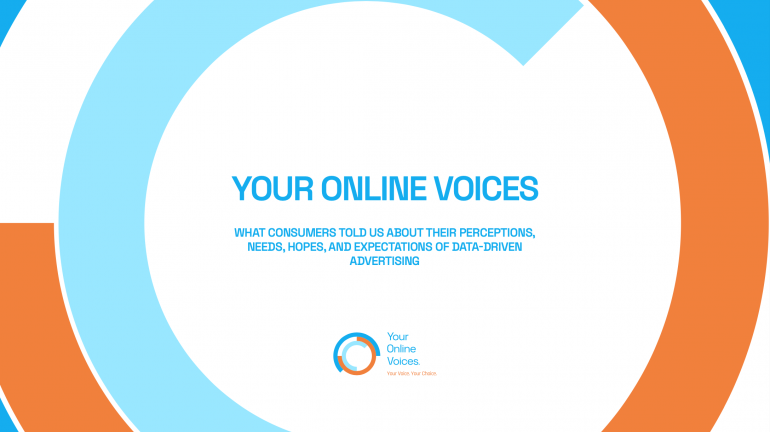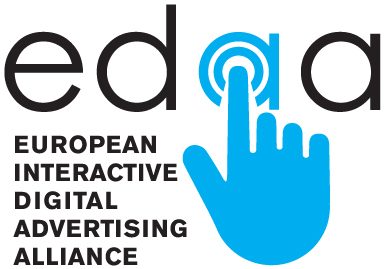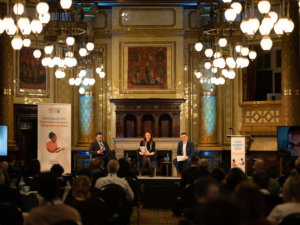
The EDAA recently collaborated with the strategic research firm, Clever Together, to better understand contemporary attitudes and opinions of European consumers with regard to tailored, personalised advertising online.
This consumer research is the first of its kind, engaging with a large scale of consumers across several European markets, in the form of deliberative conversations.
During these conversations, survey respondents were able to openly express their views as well as share their lived experiences, expectations, and needs, as well as discuss among each other in an anonymised fashion.
What emerged from the conversations
The main conversational themes centred around:
- An appreciation for the usefulness of personalised advertising. Some respondents consider personalised advertising useful and beneficial in providing access to free content and services for free, as well as to discover, understand and compare new products and services.
- More trust in familiar players. Some participants indicated that they are more likely to trust online ads from known advertisers, brands, and familiar publishers, rather than from social networks, influencer advertising or ads appearing in certain contexts such as gaming.
- Concerns about surveillance, exploitation, and misuse. While consumers see the added value of personalised advertising, they also expressed fears about being spied upon, having personal data stolen or used against them. Many respondents conveyed a perception of unfairness that they routinely surrender personal data as a default, while many companies may profit handsomely from such data.
As an outcome from these conversation themes, survey respondents identified a variety of approaches, resources and tools that they feel would help address their concerns as well as fulfil their genuine interests online. These include:
- Better controls over targeting and privacy preferences;
- Less intrusive and better quality ads;
- More responsible advertisers;
- External oversight and more regulation;
- The ability to revoke permissions quickly and easily;
- Information on how users’ data is used and handled in order to serve the ad, indication whether ads are legitimate, and a clear differentiation between ads and content; and,
- Transparency on how data is used, and more information about the advertising system in general.
The key findings from the survey
- Overall, consumer trust in different types of advertising, different advertising contexts and data-processing actors was low – achieving a maximum score of 4/10. Consumers do not differentiate between contextual and personalised advertising, but both had a higher trust score than influencer advertising.
- The key determining factor for consumer trust with data was familiarity with the publisher and advertiser.
- Overall, nearly 80% of participants agreed overwhelmingly that they would like an option to turn on/off personalised advertising as it suits them.
- In the UK, participants prefer an identifier which carries choices across all websites, while French consumers chose a dashboard where they can define and change their interests.
- Over 50% of participants stated that they do not seek information about data-driven advertising. The top 3 topics consumers were interested in learning more about what their legal rights are, how to know who to trust with their data, and what other controls they have at their disposal.
The policy and technological developments taking place within the industry represent a call for action for the EDAA to update the European Self-Regulatory Programme, and the findings of the Consumer conversation are informing its evolution so that it is in closer alignment with consumers’ evolving expectations and needs. The very important contributions and the insights generated by the in-depth analysis of data will significantly contribute to influence the direction that the digital advertising industry is – and should remain in part – self-regulated, as well as where the responsibility bar is set.
How the research was conducted
The research process was conducted in two parts:
- A Gateway survey in which respondent’s demographics, digital awareness and attitudes to digital advertising were inquired in order to better understand participation, representation and segmentation, and to compare the responses.
- The Big Conversation where four separate rooms were created for users to give a response to each of the main “challenge questions”. Participants were able to engage in the discussion posting their ideas, like and dislike seed ideas previously provided for people to react to, and submit their own ideas and comments. Also, a “My Online Choices” survey has been made available to test specific ideas such as types of interfaces and control. In a second phase of the research, the main issues identified in the previous phase concerning the possible evolution of the EDAA programme were put forward, and people were asked to react to them.
The survey forums were articulated in English and in French, and over the course of four weeks, contributions came from consumers across the United Kingdom and France, but also Belgium, Germany and Latvia, with the strongest level of participation exhibited by French and UK consumers. In total, 3,210 EU consumers logged into the survey conversations, casting over 14,229 votes, and sharing over 1,800 ideas and comments. These contributions generated more than 25,000 data points.






